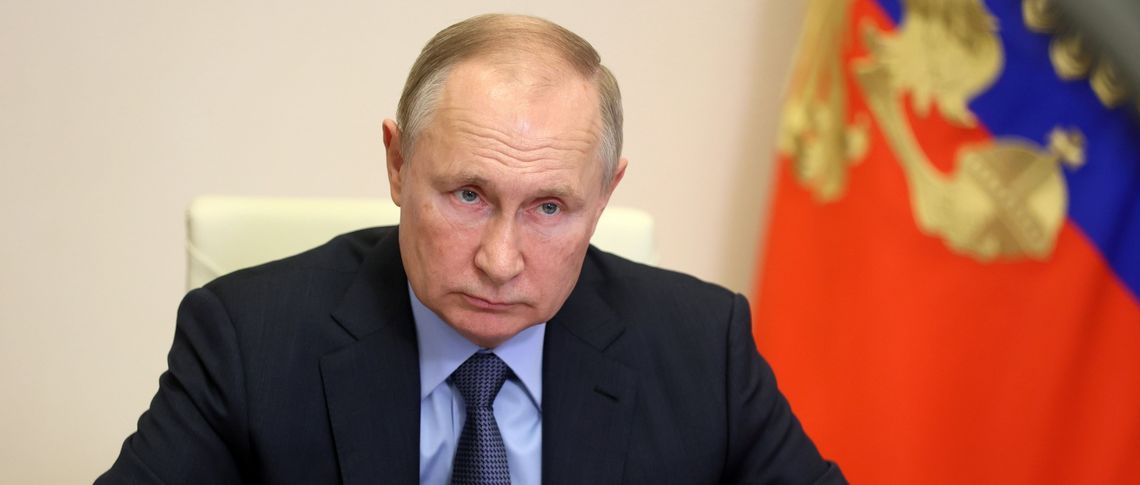Russia has deployed around 100,000 troops on the border with Ukraine. Why is the Kremlin doing that? Part of the answer is certainly that Russia wants to keeping us guessing – against the backdrop of a solid threat. Moscow itself, however, has by no means decided on its next steps. We are seeing a classic pattern of foreign policy by current Russian leadership: they prepare several options for action and then see what works. How things actually proceed depends crucially on the Western reaction and attitude – and on how clearly it is communicated.
Is the Kremlin playing Hazard? To a certain extent, of course. The stakes are high. But in the end, even in Moscow, realpolitik rules, regardless of whether it is different from ours. The leadership doesn’t want to risk two things: a far-reaching military conflict with hardly foreseeable consequences, and Russia’s own power at home.
The possibility that Russia is prepared to attack Ukraine in the hope of a limited confrontation cannot be ruled out. Of course, it will not simply attack. Perhaps it ‘will have no choice but to come to the aid of oppressed compatriots in the neighbouring country’. But to achieve that, one can first raise tensions in the neighbouring country and then draw new red lines.
Russia’s motives
There is probably a mix of motives behind the Russian decision to move so much military power to the border with Ukraine.
Firstly, the conflict, of which Ukraine has become a victim, is deadlocked. The fact that the blame for this lies primarily with Russia itself is being studiously ignored. The blame is laid solely at Ukraine’s doorstep and the West that is supposedly always keen to expand. So it might be interesting for Russia to change the status quo once more and to transform it into a lasting solution.
Secondly, we see that the international power structure is not changing in Russia’s favour. The decisive confrontation takes place between the US and China at the moment. Russia itself cannot really exert any influence on it, except as a disruptive force. It sees itself relegated to the second row. That is why Russia wants to go back to the 19th century, when strong powers consolidated their position and created buffer zones around themselves with ‘states of lesser status’.
Thirdly, eastern Ukraine, like Belarus, belongs to the ‘old Rus’, the 1,000-year-old mythical heart of national self-assurance. This is something the West must not touch – and for the nations concerned, according to the Russian interpretation, there is obviously only a limited right to self-determination. This has a different quality than the colonial conquests of Russia and the Soviet Union in later times: the Caucasus, Central Asia, the Far East, the Baltic States.
Europe is missing this leadership now and it is not clear whether or how quickly a new federal government will be able to take the reins again.
Fourthly, the situation in Russia is difficult. The repression of anything and anyone who even remotely expresses a differing opinion reveals the self-perceived threat to the current leadership’s power. Russians express a traditional mistrust of ‘those at the top’ in the continuous refusal of large parts of the population to be vaccinated against Covid-19. The expiry date of an economic model whose structural deficits are not being successfully addressed and which continues to rely on the export of fossil raw materials is also becoming increasingly clear.
Fifthly, the moment seems right. The US is primarily preoccupied with China’s sprawl. US President Joe Biden faces enormous domestic challenges and has already set his sights on the coming congressional and presidential elections. Possibly, the situation will be more favourable for Russia afterwards anyway. The Europeans are once again at odds, also because of Moscow’s active hybrid intervention. The British are out, the right-wing populists in Poland are driving their country into an almost bizarre self-isolation. French President Macron, whose rash initiative for a new partnership with Moscow has not only earned him the anger of his East-Central European partners, is also facing elections soon.
Finally, of course, Angela Merkel is gone. She was willing to engage in dialogue, but in a firm and principled manner. She knew how to unite the Europeans in many controversies over the course to be taken towards Russia. Europe is missing this leadership now and it is not clear whether or how quickly a new federal government will be able to take the reins again. There are no hopes in Moscow that the new government’s attitude towards the policies of the Russian leadership could be more friendly. Germany’s new Chancellor Olaf Scholz not only approved of the previous government’s course of action, but also actively supported it. His first statements on the current escalation were very clear. And Foreign Minister Annalena Baerbock has left no doubt that she favours a tougher stance towards Russia and China.
What should the West do now?
The West should take action in two ways. On the one hand, Russia’s escalation requires a clear and decisive response from the West. A possible Russian attack on Ukraine – under whatever pretext – must have a clear price tag. President Biden left no doubt about this before – and certainly during – his talks with President Putin. The heads of state and government of important NATO and EU countries have spoken out along the same lines. There is tight coordination between the countries.
Of course, Article 5 of the NATO Treaty does not apply to Ukraine. The transatlantic alliance will not intervene in a Russian military conflict with Ukraine. However, the fact that even supposed friends of the Russian leadership, such as Turkish President Erdoğan, support Ukraine by supplying powerful drones is nevertheless irritating Moscow.
The Russian leadership’s real or perceived concerns must be taken seriously.
In any case, there are very effective means beyond military ones to make the Russian leadership hesitate whether it should go further. Oil and gas exports contribute more than half of Russian state revenues. The Russian financial economy is dependent on Western financial systems. For Russia, drastic measures in these areas would have enormous consequences.
The authoritarian leadership urgently needs these revenues to be able to honour its part of the social contract: ‘we provide for you, you keep still.’ The Russian leadership fears few things more than losing power – and repression alone will not sustain it in the long run. How far the Western community wants to go with possible sanctions must also be weighed up with regard to its own economies. This will be a challenge for the new German government.
Russia’s self-interest
Moreover, the Russian leadership’s real or perceived concerns must be taken seriously. The other’s perception is real and must be made the starting point for a constructive political approach. But we cannot agree to Russia’s demands to recognise its shifted red lines. How would we come to deny Ukraine or Georgia rights that we – which includes Russia – have granted to every other state in the United Nations Charter or the Helsinki Final Act?
What we can do, however, is to reaffirm NATO’s decision that enlargement is not on the agenda at the moment – while understanding that it cannot be ruled out in principle. We can return together to the agreements of the NATO-Russia Founding Act, which stipulates who may station how many and which troop formations in each other’s border areas. We should revive the NATO-Russia dialogue and use the good instruments of the OSCE. We can agree on mutual inspections and resolutely advance the disarmament talks that have already begun. We should declare our persistent willingness to resolve existing conflicts through dialogue and to work together on the major issues that concern Russia as much as they concern us: climate change, arms control, the fight against terrorism and pandemics.
And above all, we should do one thing: make it clear to Russia that the West is also an attractive partner economically, and is prepared to offer an alternative to China on an equal footing. Moscow is increasingly finding that Beijing is assigning the role of a junior partner to Russia in its policy of international expansion. Here, we can successfully rely on Russia’s medium-term interests: If there is one thing Moscow fears internationally, it is becoming dependent.
We should not hope to maintain close friendly relations tomorrow with a Russia that is going down a difficult path under its current leadership. But we should give the day after tomorrow a chance. With a determined approach and willingness to engage in dialogue, patience, endurance and a long perspective towards a country that, despite all its differences and particularities, ultimately belongs to Europe more than anywhere else.






